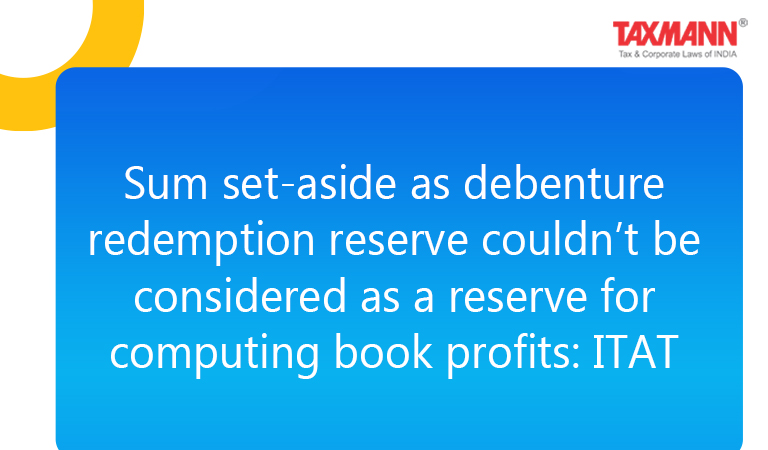Sum set-aside as debenture redemption reserve couldn’t be considered as a reserve for computing book profits: ITAT
- Blog|News|Income Tax|
- 3 Min Read
- By Taxmann
- |
- Last Updated on 20 October, 2021

Case Details: ACIT v. India Power Corporation Ltd - [2021] 131 taxmann.com 41 (Kolkata - Trib.)
Judiciary and Counsel Details
-
- A.T. Varkey, Judicial Member and Dr. M.L. Meena, Accountant Member
- Praveen Kishore, CIT for the Appellant.
- Soumen Adak, AR for the Respondent.
Facts of the Case
The Assessing Officer had disallowed Rs. 3.50 crore while computing income under section 115JB. According to him, the Debenture Redemption Reserve was carried to reserve, so it should be added back under Explanation 1(b) to section 115JB. Thus, he added back the amount to book profit.
The assessee preferred an appeal before the CIT(Appeals), who gave relief to the assessee. Aggrieved-revenue filed the instant appeal before the Tribunal.
The Kolkata Tribunal has held that an amount of Rs. 3.50 crore was transferred by the assessee to Debenture Redemption Reserve. It was required to be paid at the time of redemption of the debentures, and the assessee claimed exclusion of it while computing book profit under section 115JB.
The Hon’ble Supreme Court in the case of National Rayon Corp. Ltd. vs. CIT [1997] has held that “the basic principle is that an amount set apart to meet a known liability cannot be regarded as reserve”. It is common knowledge that by issuing debentures, a company takes a loan which it has to repay, and the loan is taken against the security of its assets. Even though the loan need not be repaid in the year of account, the obligation to repay exists. Therefore, any money that is set apart to meet a known liability is shown in the Balance Sheet under the head liability.
ITAT Held
In the instant case, the amount transferred to Debenture Redemption Reserve was not in excess of the amount required to be paid at the time of repayment of the debentures. Thus, it cannot be treated as a reserve for the purpose of Schedule VI to the Companies Act, 1956. Accordingly, such Debenture Redemption Reserve cannot be considered as ‘reserve’ to attract Explanation 1(b) of section 115JB.
Case Review 1
-
- SREI Equipment Finance (P.) Ltd. v. Dy. CIT [IT Appeal No. 424 (Kol.) of 2011, dated 11-4-2011] (para 11)
- Chambal Fertilisers & Chemicals Ltd. v. Jt. CIT [D.B. IT Appeal No. 52 of 2018, dated 31-7-2018] (para 15)
Case Review 4
-
- Rain Commodities Ltd. v. Dy. CIT [2010] 40 SOT 265 (Hyd.) (para 19)
List of Cases Referred to
-
- National Rayon Corpn. Ltd. v. CIT [1997] 93 Taxman 754/227 ITR 764 (SC) (para 11)
- SREI Equipment Finance (P.) Ltd. v. Dy. CIT [IT Appeal No. 424 (Kol.) of 2011, dated 11-4-2011] (para 11)
- CIT v. Raymond Ltd. [2012] 21 taxmann.com 60/209 Taxman 65 (Bom.) (para 11)
- SREI Infrastructure Finance Ltd. v. Addl. CIT [IT Appeal No. 1318 (Delhi) of 2012, dated 31-12-2019] (para 14)
- Chambal Fertilisers and Chemicals Ltd. v. Jt. CIT [D.B. IT Appeal No. 52 of 2018, dated 31-7-2018] (para 15)
- ITC Ltd. v. ACIT [IT Appeal No. 685 (Kol.) of 2014, dated 27-11-2018] (para 15)
- Peerless General Finance & Investment Co. Ltd. v. Dy. CIT [IT Appeal No. 937 (Kol.) of 2018, dated 24-4-2019] (para 15)
- Dy. CIT v. Tega Industries Ltd. [2019] 112 taxmann.com 259 (Kol. – Trib.) (para 15)
- CIT v. Veekaylal Investment Co.(P.) Ltd. [2001] 116 Taxman 104/249 ITR 597 (Bom.) (para 17)
- Rain Commodities Ltd. v. Dy. CIT [2010] 40 SOT 265 (Hyd.) (para 19).
Disclaimer: The content/information published on the website is only for general information of the user and shall not be construed as legal advice. While the Taxmann has exercised reasonable efforts to ensure the veracity of information/content published, Taxmann shall be under no liability in any manner whatsoever for incorrect information, if any.

Taxmann Publications has a dedicated in-house Research & Editorial Team. This team consists of a team of Chartered Accountants, Company Secretaries, and Lawyers. This team works under the guidance and supervision of editor-in-chief Mr Rakesh Bhargava.
The Research and Editorial Team is responsible for developing reliable and accurate content for the readers. The team follows the six-sigma approach to achieve the benchmark of zero error in its publications and research platforms. The team ensures that the following publication guidelines are thoroughly followed while developing the content:
- The statutory material is obtained only from the authorized and reliable sources
- All the latest developments in the judicial and legislative fields are covered
- Prepare the analytical write-ups on current, controversial, and important issues to help the readers to understand the concept and its implications
- Every content published by Taxmann is complete, accurate and lucid
- All evidence-based statements are supported with proper reference to Section, Circular No., Notification No. or citations
- The golden rules of grammar, style and consistency are thoroughly followed
- Font and size that’s easy to read and remain consistent across all imprint and digital publications are applied



 CA | CS | CMA
CA | CS | CMA
